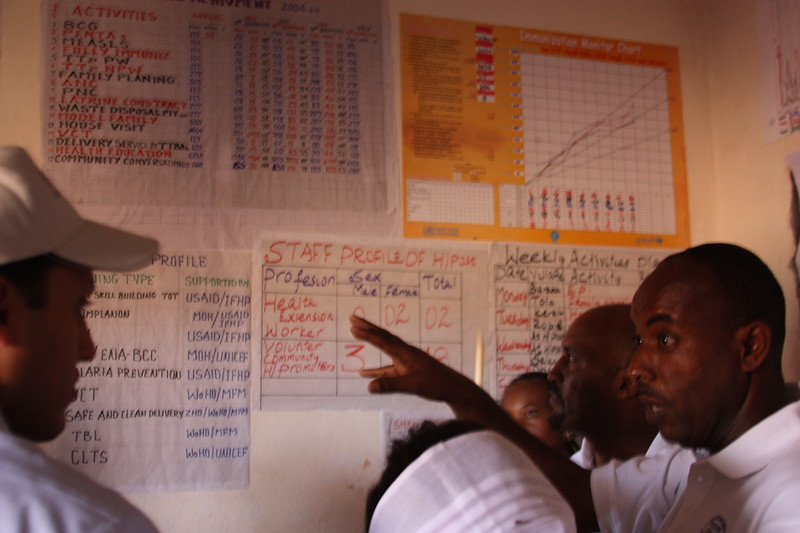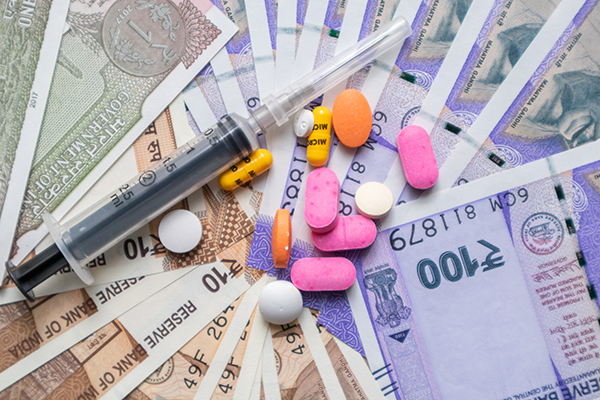Recommended

Event
In April, CGD hosted a discussion on the findings of the Task Force on Fiscal Policy for Health led by Larry Summers and Michael Bloomberg: Health Taxes to Save Lives. At the event, we focused on the evidence—how smart fiscal policies to tax tobacco, alcohol, and sugar-sweetened beverages could save lives and help economies. Former Minister of Finance and now CGD non-resident fellow Mauricio Cardenas talked about the role of finance officials in these policy reforms. Now, Pamela Gongora-Salazar, a former ministry of health official in Colombia, shares her account of how health taxes happen (or don’t) in the real world. Pamela describes the sequence of events in Colombia as a soccer game in which policy change requires a whole team of people across institutions and sectors to move proposals forward, and where there is a clear opposing team—industries with influence in every part of politics and society.
A Soccer Game for Our Health
Pamela Góngora Salazar
Raising taxes to reduce consumption of harmful products is not easy. Taxes are unpopular among the public at large, and the game gets more complex when taxes go against the commercial interests of giants like tobacco or soft drink companies. In December 2016, Colombia played that game and the match ended in a tie: tobacco taxes increased but it was not possible to introduce a tax on sugar-sweetened beverages.
Who were the players? How was the victory against smoking achieved? What was missing to prevent the late goal from the sugary drinks industry?
To start with, here is the context: In Colombia non-communicable diseases (NCDs), such as cancer, diabetes, and cardiovascular disease, account for 71 percent of total deaths. Like in many other middle-income countries, tobacco use and high intakes of free sugars are some of the most common causes of NCDs in Colombia. By 2015 Colombia had one of the lowest taxes on tobacco products in the Americas; while in Colombia the average price for cigarettes was $1.82 (PPP), in countries such as Chile, Ecuador, and México the cost of cigarettes was above $5. In addition, 56 percent of Colombians are overweight and the tendency to obesity is increasing. Taxation of sugary beverages and tobacco have been demonstrated to be highly cost-effective and are among the most effective “best buys” advocated by the World Health Organization to tackle the high burden of NCDs.
The first half of the game started at the end of 2014 with the former health minister, Alejandro Gaviria, as the technical director of the team in favour of health taxes. The first move was made within the framework of the National Development Plan (NDP), the law that lays down the proposals of the incoming government. The minister publicly announced the intention to incorporate into the bill an increase in tobacco taxes and to create a new excise tax on sugary drinks. The opposing team responded straightaway with statements in the media against the proposal, arguing that a tax increase on tobacco-based products would promote cigarette smuggling into the country, and a soda tax would increase unemployment rates.
The Ministry of Health had to carefully plan the attack strategy. A technical team was set up, consisting of epidemiologists, economists, and lawyers. Under the direction of the minister, these players began the construction of two technical studies (tobacco and sugary drinks) to support the fiscal policy proposals. In turn, to reinforce the midfield, the World Bank—a veteran of the game that has faced similar matches in other countries around the world—entered the pitch to support the tobacco tax increase.
Due to the tobacco and sugary drinks lobbyists in Congress and some state institutions, none of the taxes managed to consolidate, ending the first half 0–0. Nevertheless, as the second half began, the national government increased the pressure with a large tax reform proposal. In 2016 the Ministry of Health sent the technical document and a law proposal to the Ministry of Finance and the Commission of Experts in charge of proposing changes to the country’s tax structure: it was necessary to double the retail price of tobacco-based products through higher taxes, and to tax sugary drinks at a 20 percent rate. Both proposals would not only reduce consumption of these products, but would also make it possible to raise domestic revenues by at least 2 trillion Colombian pesos (US$650 million). Those additional resources were seen as necessary given Colombia’s strained fiscal scenario.
Civil society organizations and the academy entered the pitch to strengthen the defence. In the media, national NGOs reinforced the message about the benefits of taxing unhealthy products, and mobilized the support from a few in Congress. The letters of support from public health institutes and scholars from renowned universities worldwide reinforced the message in the public fora.
Nonetheless, the Ministry of Finance was slightly skeptical about tobacco taxes for fears of smuggling. At that moment the Ministry of Health and the World Bank decided to call up foreign players: in August 2016 five experts from Chile, Uruguay, Costa Rica, Peru, and Brazil proved to the deputy minister of finance that tobacco taxes save lives, reduce health expenses, generate increased revenues—and do not escalate smuggling in the country. From that moment on, the Ministry of Finance was on the team in favour of health taxes. The ball entered the final third with the proposal to increase tobacco taxes incorporated into the tax reform bill.
Not long after, the sugar tax proposal was incorporated into the bill. However, the fears raised by the drinks industry were strong and the lobbyists’ presence in Congress was crushing. They contended that a “sin tax” would not discourage sugary drinks consumption—despite evidence from Mexico, the UK, and France.
The game turned more tense with the formal debates in the Congress and the mass media. In response to any announcement of support for health taxes, the tobacco and sugary drinks industries counterattacked with articles in magazines or statements on radio or television. The public health team sought to communicate the message to the public, based on empirical evidence, and thereby dispel the fears that the industry was trying to infuse. It was particularly difficult in the case of sugary drinks, since beverage giants were also the owners of Colombia’s major TV networks. They even convinced the government to eject one of the best players promoting the sugary beverage tax by ordering their ads off the air.
To increase tobacco taxes, the team was unerring when discussing the tax reform bill. The Ministry of Health defended the proposal with irrefutable scientific evidence, and the minister of finance, Mauricio Cárdenas, wore the team shirt in favour of health taxes. The whole team was in the box. The team scored with a “bicycle kick” in December 2016: the reform doubled the excise tobacco tax to COP$1,400 and tripled it to COP$2,100 in 2018.
However, in the last minute, the sugary drinks industry scored an equalizing header. In the Congress, the proposal of the bill was eliminated, with no opportunity for debate.
The game ended with a 1–1 draw. However, it is worth highlighting four valuable lessons for future efforts to pass health taxes:
-
Rigorous and independent empirical evidence is essential. It is therefore crucial to have the support of national and international experts in the field.
-
The tax proposals must be clearly transmitted to the public at large. By the same token, it is critical to respond plainly and rapidly to misleading and inaccurate industry arguments against health taxes.
-
The power of the industry over the mass media and within Congress should be discussed with transparency. It is a debate that must occur in the public sphere, on behalf of a truly democratic state.
-
On a soccer team, all players are relevant. This requires a strategic alignment between the ministry of health, the ministry of finance, the academy, NGOs, and international organizations. A winning formula requires a committed leader, knowledgeable of all available evidence and willing to defend public health.
El abril, CGD fue anfitrión de una discusión de los descubrimientos del Grupo de Trabajo en Política Fiscal para la Salud liderado por Larry Summers y Michael Bloomberg: Impuestos a la Salud para Salvar Vidas. En el evento, nos enfocamos en la evidencia de como políticas fiscales impositivas al tabaco, alcohol, o a bebidas azucaradas podría salvar vidas y salvar a los países. El exministro de Finanzas e investigadora Senior no residente, Mauricio Cárdenas, conversó acerca del rol de los oficiales de finanzas en estas reformas de política. Ahora, Pamela Gongora-Salazar, exministra de Salud en Colombia, comparte su punto de vista de cómo (o no) los impuestos de salud suceden en el mundo real. Pamela describe la secuencia de eventos en Colombia cómo un Partido de fútbol, en el cual los cambios de política requieren un equipo entre instituciones y sectores para sacar propuestas hacia adelante, y en el cual hay un equipo de oposición muy claro – industrias con influencia en cualquier parte de la política y la sociedad.
Un Partido de juego para nuestra salud
Aumentar impuestos para reducir el consumo de productos dañinos no es fácil. Los impuestos son impopulares frente al público, en general, y el juego se vuelve más complejo cuando los impuestos van en contra de los intereses comerciales de gigantes como las compañías de tabaco y de bebidas ligeras. En diciembre del 2016, Colombia jugó ese juego y el partido culminó en empate: los impuestos al tabaco incrementaron, pero no fue posible introducir un impuesto en las bebidas azucaradas.
¿Quiénes fueron los jugadores? ¿Cómo fue alcanzada la victoria contra el fumar? ¿Qué faltó para prever el objetivo tardío desde la industria de las bebidas azucaradas?
Para comenzar, este es el contexto: en Colombia, las enfermedades no contagiosas (ENC), tales como el cáncer, la diabetes, y las enfermedades cardiovasculares, son aproximadamente 71% del total de muertes. Como en muchos países de ingresos medio, el uso de tabaco y la alta ingesta de bebidas azucaradas son de las mayores causas de ENC en Colombia. Para el 2015, Colombia tuvo uno de los menores impuestos en productos de tabaco en las Américas, mientras que en Colombia el precio promedio por cigarros fue de $1.82 (PPP), en países como Chile, Ecuador, y México, el costo de los cigarros estuvo por alrededor de $5. Además, 56% de colombianos se encuentran con sobrepeso y esta tendencia a la obesidad está incrementando. La imposición en bebidas azucaradas y el trabajo ha sido demostrado a ser altamente costo-efectivas y están entre las medidas “mejor vendidas” promovidas por la Organización Mundial de la Salud para enfrentar el alto gravamen a las ECDs.
La primera mitad del Partido comenzó a finales del 2014 con el exministro de Salud, Alejandro Gaviria, cómo director técnico del equipo a favor de los impuestos a la saludo. El primer movimiento fue hecho dentro del marco del Plan de Desarrollo Nacionales, la ley que englobaba las propuestas del gobierno sucesor. El ministro públicamente anunció la intención de incorporar a la agenda un aumento en los impuestos al tabaco y a crear un nuevo impuesto indirecto en bebidas azucaradas. El equipo contrario respondió con declaraciones en los medios en contra de la propuesta, argumentando que impuesto a los productos basados en tabaco pueden promover contrabando de cigarros en el país, y en impuesto a las bebidas gasificadas incrementaría las tasas de desempleo.
El Ministro de Salud tuvo que, cuidadosamente, planear una estrategia de ataque. Se reunión un equipo de trabajo, consistiendo en epidemiologuitas, economistas, y abogados. Bajo la dirección del ministro, estos jugadores comenzar la construcción de dos estudios técnicos (tabaco y bebidas azucaradas) para apoyar las propuestas de política fiscal. Para reforzar el medio campo, el Banco Mundial – un veterano en el juego que ha enfrentado partidos similares en otros países alrededor del mundo – entró al campo para incrementar el impuesto al tabaco.
A causa de los lobistas en el Congreso y algunas instituciones públicas, ninguno de los impuestos se llegó a consolidar, terminando la primera mitad en 0-0. Sin embargo, ni bien comenzó el Segundo tiempo, el gobierno nacional incrementó la presión con una gran reforma impositiva. En el 2016, el Ministro de Salud envió un documento técnico y una propuesta de ley al Ministerio de Finanzas y una Comisión de Expertos encargados de proponer cambios a la estructura impositiva del país: era necesario duplicar el precio de venta de los productos basados en tabaco a través de más impuestos, y un impuesto a las bebidas azucaradas al 20%. Ambas propuestas, no solamente reducirían el consume de estos productos, pero también harían posible aumentar los ingresos domésticos en al menos 2 trillones de pesos colombianos (US$650 millones). Estos ingresos adicionales fueron vistos como necesarios dado el ajustado escenario fiscal de Colombia.
Las organizaciones civiles y los académicos entraron en el cambio de juego para fortalecer la defense. En los medios, las ONGs nacionales reforzaron el mensaje sobre los beneficios de aumentar los impuestos a productos dañinos, y movilizaron el apoyo de pocos en el Congreso. Las cartas de apoyo de las instituciones de salud públicas y escolares de universidades alrededor del mundo reforzaron esta idea desde el punto público.
Sin embargo, el Ministerio de Finanzas estuvo algo escéptico sobre los impuestos al tabaco por miedo al contrabando. En ese momento el Ministerio de Salud y el Banco Mundial decidió llamar a jugadores extranjeros: en agosto del 2016, cinco expertos de Chile, Uruguay, Costa Rica, Perú, y Brasil, demostraron al Viceministro de Finanzas que los impuestos al tabaco salvan vidas, reducen los gastos de salud, generan incrementos de ingresos, y no escalan en contrabando al país. Desde ese momento, el Ministro de Finanzas estuvo a favor de los impuestos a favor de la salud. La pelota entró en el último tercio con la propuesta de incrementar los impuestos al tabaco incorporándolo en la lista de reformas tributarias.
No mucho después, la reforma a las bebidas azucaradas fue incorporado dentro de las propuestas. Sin embargo, los temores alzados por la industria fueron Fuertes, y la presencia de los lobistas en el Congreso fue demoledora. Ellos mencionaban que un “impuesto al pecado” no desincentivaría el consumo de bebidas azucaradas, a pesar de la evidencia en México, Reino Unido, y Francia.
El juego se volvió más tenso con los debates formales en el Congreso y en los medios masivos. En respuesta a cualquier anuncio en apoyo a los impuestos a la salud, las industrias de tabaco y de bebidas azucaradas contraatacaron con artículos en revistas, o declaraciones en la radio o la televisión. El equipo de salud pública estuvo forzado a comunicar el mensaje al público, basado en evidencia empírica, y con ello, desaparecer los miedos que la industria estuvo tratando de difundir. Esto fue particularmente más difícil en el caso de las bebidas azucaradas, dado que los gigantes también eran dueños de las mayores redes de televisión en Colombia. Incluso, convencieron al gobierno de expulsar a uno de los mejores jugadores promoviendo el impuesto a las bebidas azucaradas al sacar sus impuestos fuera del aire.
Para incrementar los impuestos al tabaco, el equipo estaba inequívoco al discutir la reforma tributaria. El Ministerio de Salud defendió la propuesta con evidencia científica irrefutable, y el Ministerio de Finanzas, Mauricio Cárdenas, se puso la camiseta a favor de los impuestos a la salud. Todo el equipo estuvo en la caja. El equipo hizo un “gol de bicicleta” en diciembre del 2016: la reforma duplicó el impuesto a COP$1,400 y lo triplicó a COP$2,100 en el 2018.
Sin embargo, en el último minuto, la industria de bebidas azucaradas hizo un gol para igualar el marcador. En el Congreso, la propuesta fue eliminada de la reforma, sin ninguna oportunidad al debate.
El juego terminó en un empate 1-1. Sin embargo, vale la pena resaltar cuatro lecciones valiosas para pasar reformas a la salud:
- Es necesario rigurosa e independiente evidencia empírica. Es, por tanto, crucial tener el apoyo de expertos nacionales e internacionales en el campo.
- La propuesta de impuestos debe ser transmitida al público claramente. Bajo este mismo punto, es crítico responder plana y claramente en contra de los argumentos de las industrias que puedan ser inexactos o engañosos.
- El poder de la industria frente a los medios masivos y dentro del Congreso debe de ser discutido con transparencia. Este es un debate que debe ocurrir en la esfera pública, en nombre de un Estado democrático.
- En un equipo de fútbol, todos los jugadores son relevantes. Esto requiere una estrategia alineada entre el Ministerio de Salud, el Ministerio de Finanzas, los académicos, las ONGs, y las organizaciones internacionales. Una formula ganadora requiere un líder comprometido, conocedor de toda la evidencia disponible y dispuesto a defender la salud pública.
Disclaimer
CGD blog posts reflect the views of the authors, drawing on prior research and experience in their areas of expertise. CGD is a nonpartisan, independent organization and does not take institutional positions.





